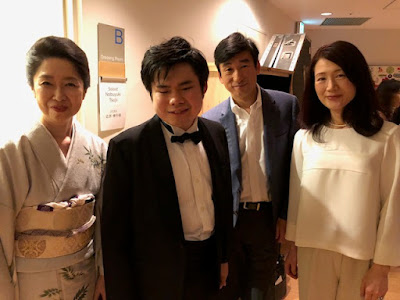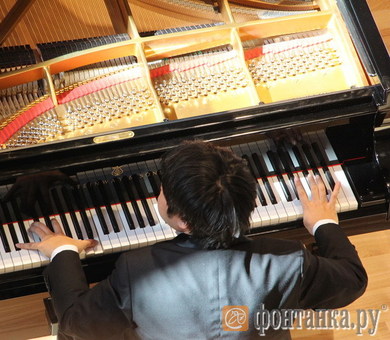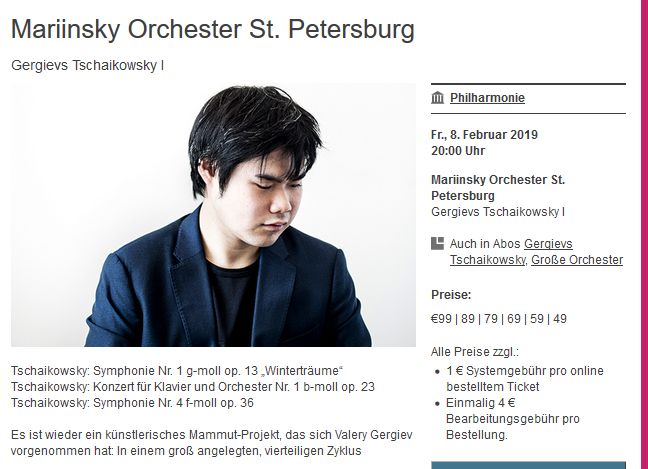This month (May 11-May 18), Nobuyuki Tsujii is on tour in Japan with Conductor Vasily Petrenko and the Royal Liverpool Philharmonic Orchestra (RLPO), joined at some performances by Nobu's violinist friend Fumiaki Miura (Fumi). The tour travels to 6 cities to make 7 performances -- all in 8 days, a superhuman schedule. On this tour, Nobu performs, alternately, Rachmaninoff's Rhapsody on Paganini's Theme and Tchaikovsky's Piano Concerto No. 1 and Grieg's Concerto; Fumi performs Vaughan Williams's "The Lark Ascending" at 4 of the shows. Each performance features two concertos. Additionally, the orchestra perform works by Walton, Shostakovich and Tchaikovsky.
The tour kicked off with a performance on May 11 in Saitama, and will conclude on May 18 in Nagano. The tour climax is perhaps a performance in Suntory Hall on May 14, this past Monday.
Today, I read with some alarm comments in this post from a male concert goer who was at that performance. I will not make a full translation of the lengthy text of this blog post, but in sum he was satisfied with the performance of Miura & Petrenko, but less so with that of Nobu.
https://ameblo.jp/sanf16/entry-12375901955.html
If Nobu seemed less animated at Suntory, it is for a good reason. He had been playing at every performance -- 4 consecutive days straight -- on this tour, at half of which (Program A) he plays two ultra demanding concertos back-to-back (Rachmaninov Rhapsody & Tchai 1), for -- as pointed out by Mr. Kawakami -- almost 60 minutes straight on stage. And he plays a solo encore (which sadly has been called "perfuntory" by one twitter). On the day of performing at Suntory Hall (May 14), Nobu [and Mr. Miura] also had to get all dressed up to be trotted out to a Press Conference for a Fall music festival organized by Suntory Hall and Avex Classics (their record label).
As a Nobu fan looking in from afar, I get a feeling that this tour is designed for the spotlights to shine on Maestro Petrenko. Of course Mr. Petrenko is also working extremely hard, what with the ultra demanding performance schedule and post-concert autograph sessions, not to mention the toll of traveling. Web postings indicate that this tour has been a big hit for the maestro, deservedly so: he has been received enthusiastically by the audience, with bravos and standing ovations; and his post-concert autograph sessions have been very popular. I admire Mr. Petrenko and I am happy for his success in Japan.
The blogger suggested that the popularity of Nobu and Fumi helped to sell out the tickets for the concerts on this tour, and I tend to agree with him. I think it is wonderful that Nobu [and Fumi] has the clout to do that. Still, like Mr. Masahiro, I hope Nobu exercises care in his ultra-busy schedule and does not overextend himself. And, while I may not agree with everything that the blogger wrote, these words do ring true:"I think it is necessary for him to re-charge even as he is very busy."
The tour kicked off with a performance on May 11 in Saitama, and will conclude on May 18 in Nagano. The tour climax is perhaps a performance in Suntory Hall on May 14, this past Monday.
Today, I read with some alarm comments in this post from a male concert goer who was at that performance. I will not make a full translation of the lengthy text of this blog post, but in sum he was satisfied with the performance of Miura & Petrenko, but less so with that of Nobu.
https://ameblo.jp/sanf16/entry-12375901955.html
辻井くんは少々物足りない~彼本来の柔らかい優しいピアノはリサイタルでこそ本領が発揮されるのでは
協奏曲が悪い訳ではなくヴァンクラーバーンやプロムスでのラフコン2のように渾身の演奏もありますが
カデンツァはよいとして強打でオケとTuttiに入っても埋没してしまう傾向は否めないところがありました
音楽に真摯に向き合う彼のその姿につい応援したくなりますが超多忙なだけに充電も必要かな
協奏曲が悪い訳ではなくヴァンクラーバーンやプロムスでのラフコン2のように渾身の演奏もありますが
カデンツァはよいとして強打でオケとTuttiに入っても埋没してしまう傾向は否めないところがありました
音楽に真摯に向き合う彼のその姿につい応援したくなりますが超多忙なだけに充電も必要かな
Tsujii-kun is somewhat unsatisfactory. His soft and gentle piano was fine in his individual recital [which the blogger previously attended]. The concerto is not a bad interpretation, but the performance is not of the whole body as at the Van Cliburn and Rach 2 at the Proms.
The cadenzas are fine, but there are places in the tutti where it was undeniable that he was drowned out by the Orchestra. I want to cheer for him for seriously confronting music, but I think it is necessary for him to re-charge even as he is very busy
The cadenzas are fine, but there are places in the tutti where it was undeniable that he was drowned out by the Orchestra. I want to cheer for him for seriously confronting music, but I think it is necessary for him to re-charge even as he is very busy
When people complain about a soloist being drowned out by the orchestra, I often wonder where the person sits, which can make a big difference on how the soloist's sound is heard.
Also, it is my opinion that a soloist can't do much to avoid being drowned out -- I believe it's up to the conductor/orchestra to modulate their collective sound to avoid that problem.
However, it is alarming that this same sentiment (Nobu's sound being drowned out by the orchestra) has been expressed elsewhere in postings that I have come across.
Also, it is my opinion that a soloist can't do much to avoid being drowned out -- I believe it's up to the conductor/orchestra to modulate their collective sound to avoid that problem.
However, it is alarming that this same sentiment (Nobu's sound being drowned out by the orchestra) has been expressed elsewhere in postings that I have come across.
More concerning still to me is the comment that "Tsujii-kun is somewhat unsatisfactory. "
This blogger 's opinion is of course just a single data point, but I have come across other posts mentioning the same -- that Nobu's performance at Suntory Hall seemed less than stellar, perhaps due to fatigue.
Reading between the lines in the latest blog post by Mr. Masahiro Kawakami, I get a sense that he too is likewise concerned.
[Translated from Japanese] "Including the Ravel 's concerto which he is to play in Austria next month, it seems he is playing 7 works in about one month ...
I think that it is wonderful for him to keep doing this carefully anyhow.
I think that it is wonderful for him to keep doing this carefully anyhow.
If Nobu seemed less animated at Suntory, it is for a good reason. He had been playing at every performance -- 4 consecutive days straight -- on this tour, at half of which (Program A) he plays two ultra demanding concertos back-to-back (Rachmaninov Rhapsody & Tchai 1), for -- as pointed out by Mr. Kawakami -- almost 60 minutes straight on stage. And he plays a solo encore (which sadly has been called "perfuntory" by one twitter). On the day of performing at Suntory Hall (May 14), Nobu [and Mr. Miura] also had to get all dressed up to be trotted out to a Press Conference for a Fall music festival organized by Suntory Hall and Avex Classics (their record label).
As a Nobu fan looking in from afar, I get a feeling that this tour is designed for the spotlights to shine on Maestro Petrenko. Of course Mr. Petrenko is also working extremely hard, what with the ultra demanding performance schedule and post-concert autograph sessions, not to mention the toll of traveling. Web postings indicate that this tour has been a big hit for the maestro, deservedly so: he has been received enthusiastically by the audience, with bravos and standing ovations; and his post-concert autograph sessions have been very popular. I admire Mr. Petrenko and I am happy for his success in Japan.
The blogger suggested that the popularity of Nobu and Fumi helped to sell out the tickets for the concerts on this tour, and I tend to agree with him. I think it is wonderful that Nobu [and Fumi] has the clout to do that. Still, like Mr. Masahiro, I hope Nobu exercises care in his ultra-busy schedule and does not overextend himself. And, while I may not agree with everything that the blogger wrote, these words do ring true:"I think it is necessary for him to re-charge even as he is very busy."













































